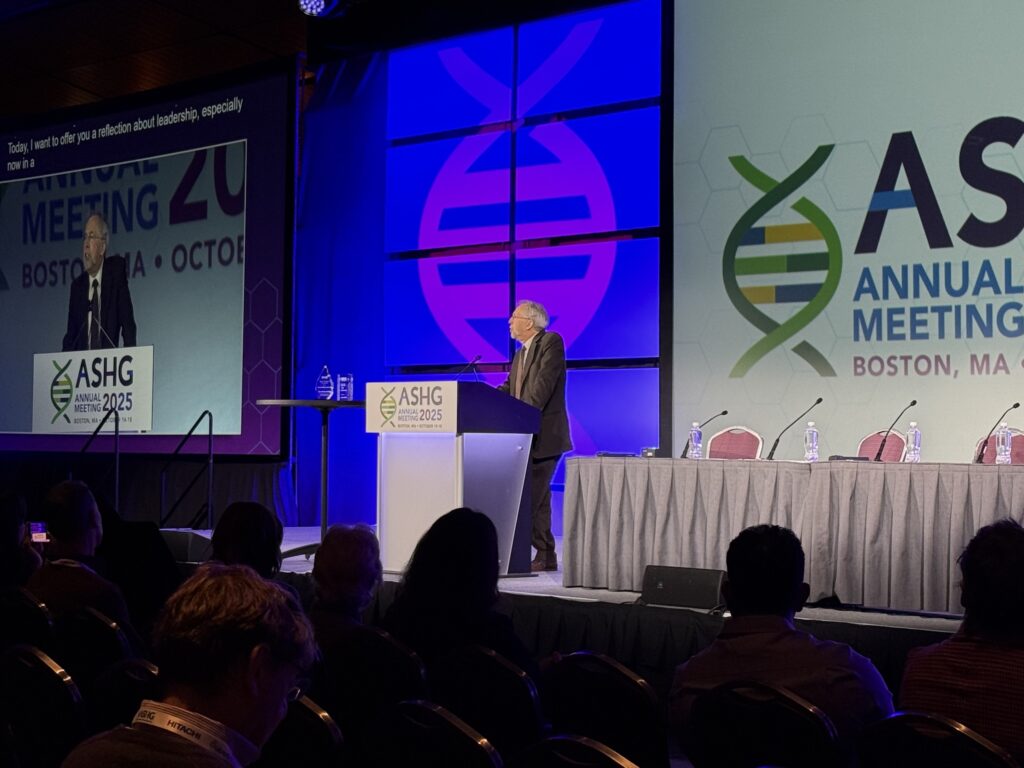The award ceremonies at ASHG are some of the best sessions of the conference. All of the speeches are moving, and each awardee is deserving. But this year, one stood out. And that is when Eric Green, MD, PhD, former director of the National Human Genome Research Institute (NHGRI), was honored with the Leadership Award.
The ASHG Leadership Award, the society states, recognizes leadership and vision in advancing the ASHG mission through promotion of genetics and genomics knowledge into the broader scientific and clinical communities.
Green served as director of the NHGRI for more than 15 years where he guided a major expansion of the institute’s research portfolio and enhanced collaborations across NIH and among other research funders and institutions worldwide.
Earlier this year, in March, Green was the first of multiple NIH directors ousted by the Trump administration.
When Sarah Tishkoff, PhD, ASHG president introduced Green, she said that he is “a visionary whose leadership has left an indelible mark on the world of human genetics and genomics” and “a tireless champion of genetic medicine and a mentor to countless emerging scientists.” His unwavering commitment, she noted, continues to shape the future of biomedical research and improve lives worldwide.
But what truly sets Green apart, Tishkoff added, is his authenticity. “He leads with empathy, heart, and passion. His genuine care for people and his unwavering belief in the power of science to improve lives makes him not only a remarkable scientist, but also an extraordinary human being.”
Green then took the stage to accept his award, express his gratitude, and offer a reflection on leadership—a particularly important message given this time of transition and uncertainty.
He said that it’s important to ask what it means to be an effective leader and how do leaders stay true to their core principles as they grow and evolve and face the unknown? He then went on to describe highlights of his professional journey and offered 12 principles of leadership that he has learned along the way.
Principal One: Foster and catalyze the success of others.
Green’s first leadership principle was learned along the way, due to excellent mentors and supporters both in his own family and throughout his training. In particular, his post-doctoral mentor Maynard Olson, PhD, he said, “thrust me to the front line of the Human Genome Project.”
Principal Two: Becoming a good leader means being a student of leadership.
Learn from your role models and your anti-role models, he said. Gain insights from every leader you encounter—good or bad. No leader is perfect; the key is to identify which traits align with your values and your style.
Principal Three: Leadership is not about being the smartest person in the room. It’s about creating space for others to lead with you.
At NHGRI, Green said, he worked hard to nurture the institute’s culture of collaboration, transparency, and trust. “I never saw myself as the sole architect of any achievement,” he said. “Rather, I was simply leading a shared vision and a collective effort. We celebrated successes together and we faced challenges together.”
Principal Four: Trust your instincts even when others disagree. Be confident in your gut feelings even when the road ahead is unclear. Boldness isn’t recklessness, it’s clarity of purpose.
One example Green used to illustrate this point was when, in 2003, some questioned whether NHGRI should proclaim the goal of achieving the $1,000 human genome sequence. Despite the critics, he said, “we forged ahead and the rest is history.”
Principal Five: Embrace audacity. Make truly audacious goals and then pursue them without apology. Don’t be intimidated by things that are genuinely hard.
This reminds Green—a baseball fan—of the line in “A League of Their Own” (which he noted he has seen 20 to 30 times) when Tom Hanks refers to being a professional baseball player with the line, “It is supposed to be hard. If it weren’t hard, everyone would do it. The hard is what makes it great.”
He noted that he has repeatedly seen genomics and genetics research face seemingly insurmountable challenges only to forge ahead and find solutions. “The hard is what makes our field so great,” he asserted.
Principal Six: Leadership is a practice, not a position.
Titles come and go. What endures is how you are remembered by your staff, by your community, by your fellow leaders. Lead by example and have no task be beneath you. Oh, and humor helps too, he added.
Principal Seven: Be serious in what you do, but don’t take yourself too seriously. Lead with humility and humor and heart.
Principal Eight: Be enthusiastic and kind.
Those are not just words, he added, but elements of a compass that have guided him throughout his career. People want their leaders to be enthusiastic and they deserve leaders who are kind and authentic.
Principal Nine: Surround yourself with great people and empower them for collective success.
Mentor them, support them, defend them, and make sure they know they can challenge you.
Principal Ten: Be a great listener.
Be willing to talk with anyone and hear what they have to say. That doesn’t mean you’ll always make them happy, but people should feel that you’re approachable and always willing to listen.
Principal Eleven: Work hard to be an effective communicator.
People want to hear from their leaders. They want the good news and they want the bad news—as long as it’s the honest news.
Principal Twelve: Above all, stay grounded to your principles. They will carry you farther than any leadership title ever could.
In addition to these twelve principles, Green also made clear that he is not letting the events of what happened in March slow him down.
“As many of you know, 2025 has brought some unexpected changes, including for me. I was the first of multiple NIH Institute directors who was removed from their leadership roles. In my case, I simply failed to DOGE the bullet of such actions,” he said to laughter. “Now I won’t dwell on that, nor will I allow it to diminish my gratitude and my pride of serving as the NHGRI director for 15 years. And I can assure you that while I have retired from federal service, I am not retiring from working in genetics and genomics, or from being an active ASHG member, or from helping to develop the next generation of our field.”



